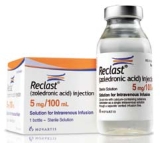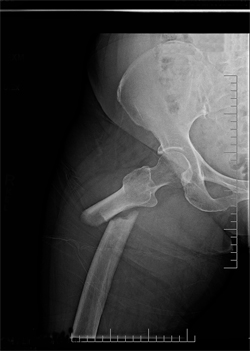Reclast Femur Fracture Lawyers - Nationwide
Did you suffer a femur fracture with little-to-no impact or trauma? Did your femur fracture happen after long-term use of osteoporosis medications such as Actonel, Aredia, Boniva, Fosamax, Prolia, Reclast, Zometa (or some combination over time)? If your answer to both of these questions is "YES," call us for a free legal consultation. We are accepting clients nationwide. Our femur fracture lawyers can be reached by calling (888) 633-5204 or by clicking HERE to submit a contact form.
 Reclast is a medication known as a bisphosphonate. It has been prescribed to treat the following: 1) treatment and prevention of postmenopausal osteoporosis; 2) treatment to increase bone mass in men with osteoporosis; 3) treatment and prevention of glucocorticoid-induced osteoporosis; and 4) treatment of Paget’s disease of bone in men and women. Reclast's label states that patients must be adequately supplemented with calcium and vitamin D during the use of this osteoporosis medication. It has also been reported to the Food and Drug Administration that atypical femur fractures have occurred in patients undergoing Reclast therapy.
If you or a loved one suffered a femur fracture after taking Reclast (or other bisphosphonates) for more than 3 years, you may have potential legal claims to assert against the manufacturer. We are accepting clients, evaluating medical records, and filing lawsuits on behalf of anyone affected by this defective drug. Doyle Law's Reclast Femur Fracture Lawyers are now evaluating cases nationwide - all 50 states and U.S. territories.
Reclast is a medication known as a bisphosphonate. It has been prescribed to treat the following: 1) treatment and prevention of postmenopausal osteoporosis; 2) treatment to increase bone mass in men with osteoporosis; 3) treatment and prevention of glucocorticoid-induced osteoporosis; and 4) treatment of Paget’s disease of bone in men and women. Reclast's label states that patients must be adequately supplemented with calcium and vitamin D during the use of this osteoporosis medication. It has also been reported to the Food and Drug Administration that atypical femur fractures have occurred in patients undergoing Reclast therapy.
If you or a loved one suffered a femur fracture after taking Reclast (or other bisphosphonates) for more than 3 years, you may have potential legal claims to assert against the manufacturer. We are accepting clients, evaluating medical records, and filing lawsuits on behalf of anyone affected by this defective drug. Doyle Law's Reclast Femur Fracture Lawyers are now evaluating cases nationwide - all 50 states and U.S. territories.
Reclast was manufactured, distributed and marketed by Novartis Pharmaceuticals Corporation in all 50 states and all U.S. territories.
Reclast Side Effects
A variety of side effects are associated with Reclast use. We are pursuing a monetary recovery on behalf of our clients for the following diagnosed injuries:
- Femur fractures;
- Hip fractures; and
- Osteonecrosis of the jaw (ONJ).
Link Between Reclast and Atypical Femur Fractures
 Femur fractures are a significant potential side effect of Actonel, Aredia, Boniva, Fosamax, Prolia, Reclast and Zometa use. Reclast has been associated with suppression of bone turnover (including osteonecrosis of the jaw (ONJ), fracture healing complications, and atypical femoral fractures). Studies have shown that Reclast can results in significant suppression of bone remodeling. The long-term consequences of the degree of suppression of bone remodeling observed with Reclast may contribute to adverse outcomes such as ONJ, atypical femoral fractures and delayed fracture healing. Other conditions posing a risk for developing ONJ include invasive dental procedures and poor oral hygiene.
Femur fractures are a significant potential side effect of Actonel, Aredia, Boniva, Fosamax, Prolia, Reclast and Zometa use. Reclast has been associated with suppression of bone turnover (including osteonecrosis of the jaw (ONJ), fracture healing complications, and atypical femoral fractures). Studies have shown that Reclast can results in significant suppression of bone remodeling. The long-term consequences of the degree of suppression of bone remodeling observed with Reclast may contribute to adverse outcomes such as ONJ, atypical femoral fractures and delayed fracture healing. Other conditions posing a risk for developing ONJ include invasive dental procedures and poor oral hygiene.
The number of Reclast-related atypical femoral fractures continues to grow. Atypical femoral fractures are subtrochanteric or proximal diaphyseal fractures that occur with little to no trauma and may be bilateral (in both legs). Specific radiographic findings, including a simple transverse or oblique fracture with beaking of the cortex and diffuse cortical thickening of the proximal femoral shaft, characterize these events.
The femur is the strongest bone in your body and suffering a fracture is not an ordinary event. It usually involves significant trauma from a direct impact (such as a car accident or fall from great heights), but almost never occurs during everyday activities. When a low-energy femur fracture does occur during ordinary, everyday activities, it is highly unusual. It should raise a serious red flag if this has happened to you. Unfortunately, in the case of osteoporosis medications such as Actonel, Aredia, Boniva, Fosomax, Prolia, Reclast, and Zometa the drug companies knew of this potential adverse side effect for years, yet failed to adequately warn its customers (and their doctors) while they actively promoted the drugs in order to reap enormous profits - $$ BILLIONS.
Once a femur fracture occurs, the typical way to treat the injury is by inserting a metal rod and sometimes screws directly into the femur itself. Undergoing a surgery to repair a broken femur can be challenging and the necessary rehabilitation afterwards can be exhausting. For most patients suffering femur fracture, the event is life-altering. There is often a need for long-term care afterwards, which is very costly even if health insurance pays a portion. It's a cost that should be borne by the parties responsible. We're now seeking compensation on behalf of our clients to hold the drug companies accountable and make our clients whole again (at least financially).
Reclast Femur Fracture Studies
In the Feb. 23, 2011, edition of the Journal of the American Medical Association (JAMA) a study was published concluding that bisphosphonate use (Actonel, Aredia, Boniva, Fosamax, Reclast, and Zometa) nearly TRIPLES the risk of drug-related femur fractures in patients who have taken the drug for more than five (5) years.
Earlier, on Oct. 13, 2010, the Food and Drug Administration (FDA) revised the warning label for Reclast and other bisphosphonates warning of the "risk of atypical fractures of the thigh, known as subtrochanteric and diaphyseal femur fractures, in patients who take bisphosphonates for osteoporosis." Atypical subtrochanteric femur fractures ( fractures in the bone below the hip joint) and diaphyseal femur fractures (fractures in the long part of the thigh bone) are rare but have been predominantly linked to patients taking bisphosphonates.

Even earlier, in a study released in the March 20, 2010 issue of the New England Journal of Medicine found that women who took Fosamax for long periods of time suffered an unusually high rate of femur fractures. The fractures had a signature horizontal pattern, and all occurred as a result of falls from standing height or less. The study, conducted by the Hospital for Special Surgery at Weill Cornell Medical College in New York City, included 15 women who took Fosomax for more than five (5) years before suffering a femur fracture. Two-thirds of the women studied had taken Fosamax for seven (7) years or longer. The authors concluded that Fosamax and femur fractures are statistically correlated.
The study’s authors also concluded that Fosamax [& Actonel, Aredia, Boniva, Reclast, and Zometa] slows down the development of strong new collagen or causes microdamage in the bone, making its users more prone to fracture. This finding is important - it is now established that bisphosphonates cause bone fractures. In particular, bisphosphonates cause atypical femur fractures.
In January 2010, prior to the publication of the first study, the FDA issued its first alert to physicians regarding the possibility of severe bone pain related to bisphosphonate therapy. As these drugs continue to be studied, the connection between osteoporosis medication and atypical femur fractures continues to grow.
Reclast Femur Fracture Lawsuits - Nationwide
The Reclast Femur Fracture injury lawyers at Doyle Law have a proven track record of success in helping our clients obtain significant compensation for injuries resulting from the use of dangerous medications like Actonel, Aredia, Boniva, Fosamax, Prolia, Reclast and Zometa.
Our experienced team of legal professionals and Reclast Injury Attorneys have been helping dangerous drug injury victims for years. We are dedicated to achieving real justice for our clients and we work diligently to achieve the best possible monetary recovery in every single case.

Contact Nationwide Reclast Femur Fracture Attorneys
Filing a Reclast Femur Fracture Lawsuit can help victims and their families affected by Reclast recover the financial compensation necessary to pay for expensive treatment and long-term care. If you or a loved one suffered a broken femur after Reclast use, you may have a defective product claim against Merck and other manufacturers. Call our offices today for a free consultation. Our toll free office number is (888) 633-5204. Do not wait another day and risk losing your claim.
Our Current Clients
We are now prosecuting femur fracture claims for plaintiffs in the following states:
- Alabama
- California
- Colorado
- Florida
- Georgia
- Illinois
- Kentucky
- Louisiana
- Michigan
- Minnesota
- Missouri
- Nebraska
- New Jersey
- New Mexico
- New York
- North Carolina
- Ohio
- Pennsylvania
- South Carolina
- Tennessee
- Texas
- Virginia
- Washington
Let us know if we can help you too.




 Fosamax, Boniva, Actonel, Prolia, Reclast, Aredia, and Zometa - medication prescribed to treat osteoporosis - are linked to femur fractures after 3 years of use. If you took any of this medication (or any combination over time) and suffered a femur fracture,
Fosamax, Boniva, Actonel, Prolia, Reclast, Aredia, and Zometa - medication prescribed to treat osteoporosis - are linked to femur fractures after 3 years of use. If you took any of this medication (or any combination over time) and suffered a femur fracture,  Mesh used during surgery to repair the vaginal wall has caused women to experience mesh erosion into the vagina, prolapse, pain during intercourse, incontinence, bowel or bladder perforation, bleeding and serious infection. We're now accepting clients with claims against AMS, Bard, Boston Scientific, Ethicon, and Johnson & Johnson. If you took have suffered any of these side effects,
Mesh used during surgery to repair the vaginal wall has caused women to experience mesh erosion into the vagina, prolapse, pain during intercourse, incontinence, bowel or bladder perforation, bleeding and serious infection. We're now accepting clients with claims against AMS, Bard, Boston Scientific, Ethicon, and Johnson & Johnson. If you took have suffered any of these side effects,  A growing number of metal-on-metal artificial hip implants are being recalled due to early failures and some patients suffering from metallosis - metal debris released from the hip compontents inflame the surrounding tissue and enter the bloodstream, causing elevated levels of cobalt and chromium. We're now accepting clients with claims aginst Biomet, DePuy, Stryker, Smith & Nephew, Wright, and Zimmer. If you have (or had) one of these devices, we can help to protect your legal rights. To contact us,
A growing number of metal-on-metal artificial hip implants are being recalled due to early failures and some patients suffering from metallosis - metal debris released from the hip compontents inflame the surrounding tissue and enter the bloodstream, causing elevated levels of cobalt and chromium. We're now accepting clients with claims aginst Biomet, DePuy, Stryker, Smith & Nephew, Wright, and Zimmer. If you have (or had) one of these devices, we can help to protect your legal rights. To contact us, 